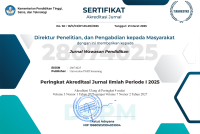TEACHING PRIMARY CLASS STUDENTS TO SOLVE TIME PROBLEMS
Abstract
Teaching time to elementary school students is important because this knowledge is useful for them in terms of time management. This research aims to describe the process of teaching time to students in elementary schools in Uzbekistan. This is a case study research (descriptive study case) where the researcher explains the Focus on providing a detailed and accurate description of the case, including the background, context, and outcomes. The data collection method used was observation. The researcher made observations during classroom learning when the teacher explained time material to students in elementary schools in Uzbekistan. The results of the research showed that the teacher succeeded in explaining the time material by providing lots of story problem practice. The conclusion obtained from this research is that story questions are an effective medium for teaching time material to students in elementary schools in Uzbekistan.
Keywords
Full Text:
PDFReferences
Abdullayeva B.S., N.A.Xamedova M. Xusanova Methodological manual "Methodology of using pedagogical technologies in primary grade mathematics lessons" - Tashkent 2010, 135 pages
Abdullayeva B.S.,.O’rinboyeva L.O’, Muhitdinova Sh.S, Ishankulova L.T.. Methodology of teaching geometrical materials to elementary school students. Educational-methodological guide intended for students of the 5141600-"primary education and educational work" bachelor's course of higher educational institutions of pedagogy - T.: OOO "Jahon - Print", 2011. - 90 pages.
Abdullayeva B.S., Xo’jamurodova Z., Umarova M., Proceedings of the republican scientific-practical conference on the topic "Relationship of mathematics and native language sciences" "Ensuring interdisciplinary coherence in the process of general secondary and secondary special vocational education" T.N. Research Institute of Pedagogical Sciences of Uzbekistan named after Qori Niyozi, Tashkent, November 20-21, 2009, pages 241-243).
Azizxodjayeva N.H "Pedagogical technology and pedagogical skills" - Tashkent.: TDPU, 2003, 174 pages.
Akhmedov M and others Mathematics 1, Tashkent.: Ozinkomsentr, 2003, p. 160.
Bikboyeva H. U. Methodology of teaching mathematics in primary grades. Tashkent. "Teacher" 1996. 510 pages.
Bergman, K. (2023). Primary students’ perceptions of history and time. Education Inquiry, 1-16.
Gravesen, D. T., & Ringskou, L. (2018). On the move from pedagogy to timeagogy? Or how time constitutes the work of pedagogues in the Danish Primary School and Leisure-time Center. IJREE–International Journal for Research on Extended Education, 5(2), 9-10.
Hsieh, J. S. (2023). Utilizing Authentic Assessment on the Concept of Time for Elementary Students. School Administrators, (146), 25-59.
Jumayev M. Laboratory training on the methodology of teaching mathematics in primary grades. Tashkent. "Generation of the New Century" 2006. 328 pages.
Rudzinska, V. (2024). Problems of Space and Time in Mathematics for Primary School Students. Розвиток іншомовного профеÑійного ÑÐ¿Ñ–Ð»ÐºÑƒÐ²Ð°Ð½Ð½Ñ Ð´Ð»Ñ Ñтудентів мовних Ñ– немовних ÑпеціальноÑтей.
Shoimov B.S, Bozorov M.N. Determination of trigonometric functions using functional equations. “Jornal of new century innovations†https://www.newjournal.org/index.php/new/article/view/12395.
Thomas, M., Clarke, D. M., McDonough, A., & Clarkson, P. C. (2023). Assessing students’ understanding of time concepts in Years 3 and 4: insights from the development and use of a one-to-one task-based interview. Mathematics Education Research Journal, 35(Suppl 1), 1-22.
Van Bommel, J., Palmér, H., & Ebbelind, A. (2023, July). Five minutes: Young students' understanding of time. In Thirteenth Congress of the European Society for Research in Mathematics Education (CERME13) (No. 27). Alfréd Rényi Institute of Mathematics; ERME.
Vivas-Moreno, V., Miralles-MartÃnez, P., & Gómez-Carrasco, C. J. (2021). Design and assessment of a teaching program to address temporal concepts in early childhood education and primary education using stories. Humanities and Social Sciences Communications, 8(1), 1-12.
DOI: https://doi.org/10.26877/jwp.v4i2.19887
Refbacks
- There are currently no refbacks.
Copyright (c) 2024 Murot Nashvandovich Bozorov

This work is licensed under a Creative Commons Attribution-NonCommercial-NoDerivatives 4.0 International License.
Jurnal Wawasan Pendidikan
ISSN 2807-5714 (Print), ISSN 2807-4025 (Online)
Universitas Persatuan Guru Republik Indonesia Semarang
Jl. Sidodadi Timur No. 24 -Dr. Cipto, Semarang
Prasena Arisyanto, S.Pd., M.Pd
Email: prasenaarisyanto@upgris.ac.id

This work is licensed under a Creative Commons Attribution-NonCommercial-NoDerivatives 4.0 International License










